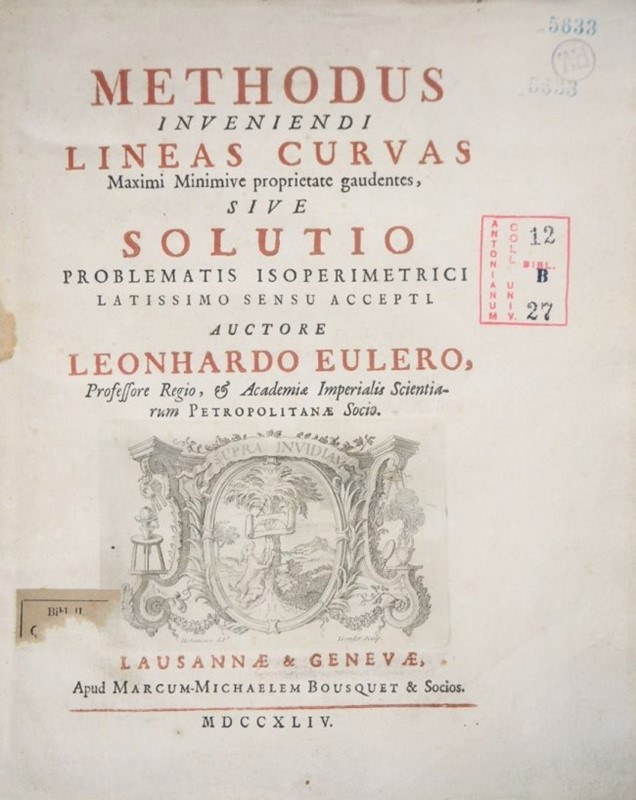Euler (Leonhard) Methodus inveniendi Lineas Curvas...sive Solutio Problematis Isoperimetrici, first edition, title in red and black with engraved vignette, 5 folding engraved plates, complete with initial blank leaf and "avis au relieur" at end, some foxing and browning, especially to last 2 plates, contemporary sprinkled half calf over paper boards, very slightly rubbed, spine label with small chip, [Bibliotheca Mechanica, p. 104; Dibner, Heralds of Science 111; Honeyman 1060; Horblit-Grolier 28; Norman 731; Sparrow, Milestones of Science 60], 4to, Lausanne & Geneva, Marc-Michel Bousquet & Co., 1744. ⁂ One of Horblit's One Hundred Famous Books in Science: the first edition of the work which is generally considered one of most significant and influential contributions to mathematics by Leonhard Euler (1707-1783). The first of his well-known trio of works devoted to calculus, which include the Introductio in Analysin Infinitorum (1748; see lot 000), and the Institutiones Calculi Differentialis (1755; see lot 000). In this work Euler defined the main principles of the calculus of variations, suggesting solutions and tools for solving variational problems which became a standard method and would be developed by the subsequent generation of mathematicians, mainly by Joseph-Louis Lagrange (see lot 000). Euler wrote his Methodus inveniendi in the period in which he worked, thanks to the patronage of King Friedrich II, at the Academy of Sciences in Berlin, after his first stay in St. Petersburg.
Euler (Leonhard) Methodus inveniendi Lineas Curvas...sive Solutio Problematis Isoperimetrici, first edition, title in red and black with engraved vignette, 5 folding engraved plates, complete with initial blank leaf and "avis au relieur" at end, some foxing and browning, especially to last 2 plates, contemporary sprinkled half calf over paper boards, very slightly rubbed, spine label with small chip, [Bibliotheca Mechanica, p. 104; Dibner, Heralds of Science 111; Honeyman 1060; Horblit-Grolier 28; Norman 731; Sparrow, Milestones of Science 60], 4to, Lausanne & Geneva, Marc-Michel Bousquet & Co., 1744. ⁂ One of Horblit's One Hundred Famous Books in Science: the first edition of the work which is generally considered one of most significant and influential contributions to mathematics by Leonhard Euler (1707-1783). The first of his well-known trio of works devoted to calculus, which include the Introductio in Analysin Infinitorum (1748; see lot 000), and the Institutiones Calculi Differentialis (1755; see lot 000). In this work Euler defined the main principles of the calculus of variations, suggesting solutions and tools for solving variational problems which became a standard method and would be developed by the subsequent generation of mathematicians, mainly by Joseph-Louis Lagrange (see lot 000). Euler wrote his Methodus inveniendi in the period in which he worked, thanks to the patronage of King Friedrich II, at the Academy of Sciences in Berlin, after his first stay in St. Petersburg.













.jpg)

Try LotSearch and its premium features for 7 days - without any costs!
Be notified automatically about new items in upcoming auctions.
Create an alert